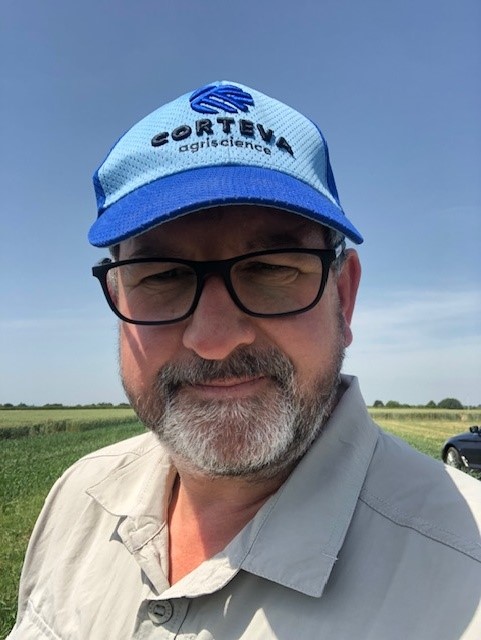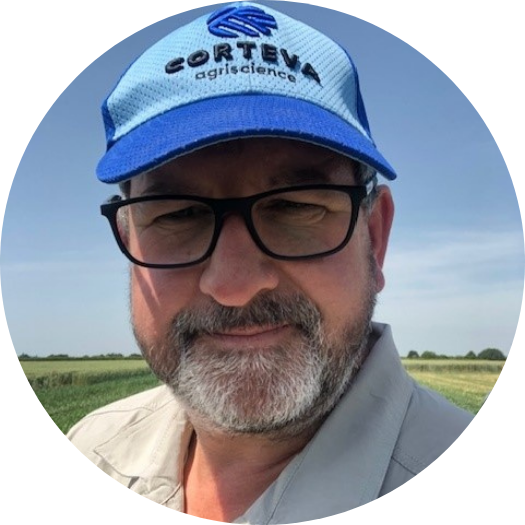Firstly John, what is Integrated Field Sciences?
Field Sciences are part of Crop Health Research and Development. Our function at Corteva is to Discover, Develop and Deliver the pipeline comprising of conventional chemistry and biological advancements. This is no mean feat and involves many stakeholders over many years! Globally, Corteva invests nearly $4 million in innovation every day and employs approximately 22,500 people worldwide, with more than 5,000 dedicated to finding and delivering next-generation innovation. This is done at over 100 research sites and 2,000 testing locations worldwide.
How long does it take to bring a new product to market?
New products take years of research to reach the market. For a crop protection product, it’s around 13 years within Europe. For a Biotech trait, 16 years and for new seed hybrid or variety, 7 years.
Tell us a little bit about your role at Corteva?
I lead the Field Sciences teams across North Europe (comprising of France, Germany, Benelux, Nordics & Baltics and the UK and Ireland) to deliver on biology plans, focusing on field testing of candidate molecules with the aim of producing characterisation data and biology dossiers that will support new product registrations for Corteva.
Can you tell us a bit more about your career path?
I started at Corteva (at the heritage company, Dow Agrosciences) on a year placement from Harper Adams University when I was fresh-faced and impressionable with the field trials team. I was based in Kings Lynn and loved it. I joined Zeneca Agrochemicals (now Syngenta) after leaving Harper for a brief period, before coming back predominantly in the trials team and then moved to Wellesbourne in 2008. I then took on the Field Station Leader role, added Zonal Biology Leader responsibilities, and more recently, people leadership firstly for the UK team and more recently the teams across North Europe.
Do you have a connection to agriculture outside of Corteva?
I don't, but I have had an interest in agriculture since around age 4 and a passion for science.
What has been the most thrilling project you've worked on at Corteva?
There have been a few... From crawling around flour mills testing the impact of gas on electrical equipment while developing a fumigant, using the knowledge to develop my MSc, to the time when we moved to Wellesbourne from Oxfordshire where we initially rented a 4-hectare block and a pretty nasty office that came with its own pet mice. It has been quite the journey! When I assumed the role of Field Station Leader, I was given free rein to develop and expand our footprint. I learnt a lot about dealing with external parties and developing relationships across the company.
Another has to be my involvement with the Inatreq™ project which was both challenging and highly rewarding and gave a great foundation to leading teams to develop our future fungicides.
How do you keep up to date with the latest advancements and trends in agriculture?
I talk to colleagues – we have a great bunch working for us, read about developments in the press and attend seminars, where time allows, and get involved. I also find mentoring colleagues from other geographies a great way to learn about agriculture outside of Europe.
What advice would you give to someone aspiring to follow a similar career path as you?
I would say the key is to get involved and take opportunities as they present themselves - even if they push you outside your comfort zone or home country. Take ownership and develop relationships across geographies with your key stakeholders.
Another key piece of advice, and particularly with health and wellbeing in mind, is that there is a tendency when new to a company that you say yes to all work requests – great if you can accommodate those requests over and above your planned workload but there is a tipping point where you have overpromised and potentially underdeliver so learn the art of saying ‘No’. This seems counterintuitive, but colleagues will not think less of you but ensures you collaborate to get the job done – its all about communication.
Why would you recommend Corteva as a great place to work?
I greatly value the folks I work with across teams and countries. You will find a lot of colleagues with long periods of service, and I think this is due to the work environment, the trust and autonomy that’s given as well as the collaborative nature. Above all I've made some great friends over the years.

If you are looking for a role with a difference, Corteva is the right choice, providing valuable learning experiences. Find out more about our talented team here.
